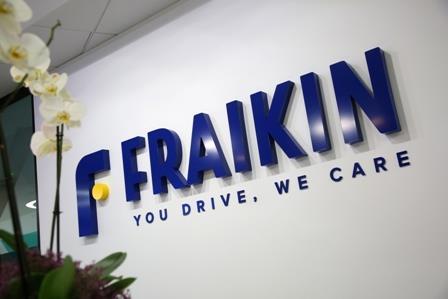
While Fraikin doesn’t replace its MDs quite as often as West Brom replaces its managers – seven in the last five years – Darren Hall is the third person to take charge of the French-owned contract hire firm since 2016.
In the intervening four years Fraikin was subject to an unsuccessful takeover bid from Petit Forestier which was blocked because of the large share of the French market the merged businesses would have had. Instead, it was acquired by a private equity consortium comprising Alcentra, Värde Partners and Canyon Partners in a deal that saw the group’s net debt cut by €350m (£308m).
Hall was appointed MD in February 2020, replacing the genial former CEO Ed Cowell, who moved on to become CEO of serviced offices provider Landmark.

Hall’s business career started in 1985 with 12 years at a small subsidiary of the engineering conglomerate Smiths Industries
“Then I was fast tracked and when they would buy a company I'd be part of the team doing the post-acquisition integration,” he says. “I worked my way from a buying assistant to operations director for their medical business.”
After leaving Smiths, Hall spent the next six years acquiring, turning around and running various UK manufacturing operations until in 2003 he was offered the opportunity to go to Singapore.
“We started a manufacturing business out there, built it up and sold it in 2007,” Hall recalls. “I had a fantastic time living in Singapore, it was just wonderful.”
But all good things must come to an end and in 2008 he returned to the UK where he restructured Laing O'Rourke’s plant hire business before moving to a biotech start-up which was bringing a viral detection device to market.
“That was for H1N1, the avian flu that was big at the time,” Hall says. “This was a nasal or oral swab and we could get a result in 45 minutes. We got the technology right and sold it to GSK.
“Then I joined a company called SafetyKleen Europe in 2011 as their group operations director, and had a fantastic three years in that business. I had the opportunity to travel around the world again, but also became MD of their UK business, and that's when I came across Fraikin.”
SafetyKleen Europe is a private equity-owned parts cleaning and environmental services business and its biggest cost, making up 35% of outgoings, was fleet.
“I assembled the German, French, Spanish, English, Portuguese and Eastern European operations directors in a room, and asked them ‘what are we going to do to derive value from this?’
“Of course, no one had any answers and so my UK operations director recommended I meet with Fraikin in 2011. Within half an hour, they had drawn out on a piece of paper what I should do as a fleet strategy. Then they came in and did a full fleet evaluation for me and they put everything down in a very simple report showing me what my costs were, how they were trending, what they could do to change it, what the value levers were and what they could change.
“It was the first major project I took through the board and SafetyKleen UK outsourced all of its fleets to Fraikin. It was a very successful project, I got to know the guys at Fraikin very well - Peter Backhouse [then CEO], David Fairbon [then commercial director] and those in Paris.”
Not quite Singapore
When Hall left SafetyKleen in 2014 he got the call from Fraikin asking if he would go and set up an operation in the Middle East, based in Saudi Arabia, which is not quite Singapore.
“Saudi was not top of my list of work locations in the world,” Hall admits. “I've worked in the US twice, spent a lot of time in Asia and Australia, but I'd never worked in the Middle East.
"But it was an exciting situation to take a business model that I knew very well into a location where it didn't exist with a joint venture between Europe's number one truck rental business and a Saudi investor. So to me it was a really good opportunity.”
Hall started out on his own in Riyadh in February 2015. “I was the only person there, so I got the business licensed, got the bank financing in place, signed the first contracts, ordered the trucks, delivered them, found the first workshop location and recruited the workshop engineers.
“Within two and a half years I got the business up to 25 people with 600 trucks on the road with customers, signed the biggest Saudi dairy company and we were bringing in annually around €7m.
"But then things changed politically and the banks stopped lending to any Saudi-related businesses. So the Fraikin board decided to sell the business, and in 2019 I helped sell to a local partner.”
In late 2019 Cowell announced his departure from Fraikin UK and Hall was invited to take over.
“I had very fond memories of that UK business,” he says. “Being a customer, I just liked the culture, the way they work and the friendliness and familiarity of it.”
Turnaround business?
Fraikin’s worldwide turnover is now approaching €1 billion, and its UK operation brings in around £90m. While it was profitable, given Hall’s background, does his appointment mean the new owners and Fraikin Group CEO Philippe Mellier see Fraikin UK as a business in need of a turnaround?
“If you look at my career, the common theme is there's a problem, it needs sorting out, and I come in,” agrees Hall. “But I would say I quite like a business where I've got my arms around it. The Fraikin business, I can do that very easily. I really understand it. I can reach all the people and I really enjoy what I'm doing.
“I wouldn't classify it as a turnaround in the classic sense. Certainly, the business has not fulfilled its potential. When you look at the numbers, they are not exciting, that's clear.
"The conversation with the shareholders was that we need someone to give us a roadmap for this business and show us what the potential is, what is its role in the UK market and how to get there. They didn't have that.
“Maybe the previous management had been giving some confusing messages out there but at the end of the day it all boils down to numbers and they're not impressive, and so there's definitely room for improvement there.”
The fiercely competitive UK truck and trailer contract hire market has seen a few failures in recent years as rates on vanilla 6x2 tractors in particular have plumbed new depths.
Value proposition
That is not a market Fraikin has ever played in, preferring the more specialist niche end of the market, which must limit its growth potential.
“I looked at the business, I knew what its value proposition was, and it still delivers that value proposition very well,” says Hall. “It has very loyal customers and it's got good top-line growth. But when you look at the bottom line, it's just gone down and down. When I looked at what had been happening in the UK business, they had made a series of decisions that weren’t the smartest and were backfiring.”
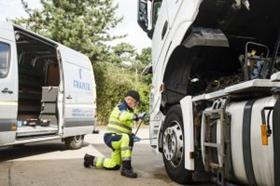
One of Fraikin’s USPs is that, contrary to some other players which are relying more and more on dealers for R&M, it has retained its internal workshop capacity.
“We've got five workshops and a small mobile tech team, so let's expand that,” argues Hall. “To me, having a mobile technician network is incredibly important. When you think about the market strategically and you think about the vehicle OEMs, they are bringing out vehicles on leasing plans that compete with Fraikin.
“So Fraikin has to have something that's much more value-add. Having the mobile tech network and our workshops means we are able to be there very quickly and manage the whole vehicle including the fridge unit and the tail lift. Doing all those things is very important.
“We had to muscle ourselves back into the market by being relevant. So we're reopening our Bristol location, we've reopened our own breakdown centre and we're expanding the mobile tech team from 22 to 55.”
Growing inhouse R&M
When Hall joined the business, just 8% of R&M was inhouse. By the end of 2021, he wants to see that rise to 40%, a change he says will also be “a significant advantage to us financially”.
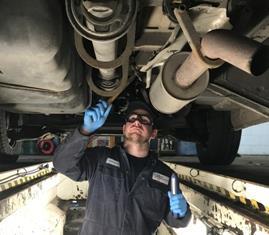
This approach is in some ways a return to that of the former management team under Peter Backhouse, who was in charge when Hall was a customer.
“To be candid I feel that with Peter—who I'm still good friends with - it was a good team. I remember as a customer being impressed with him, David Farbon and Colin Melvin [then sales director]. You had depth and a team of people who understood the business and how to onboard a customer to provide service. When Peter, David and some other people left, that changed quickly.
“For me, our business is not about trucks, it's a service rental model. If you've got guys coming in from DAF or MAN who sold trucks, it's a different thing.”
Cost management DNA
Hall describes Fraikin's DNA as “the rigorous management of vehicle operating costs”.
“We have to be absolutely brilliant at it. If we're not, we let the customer down and we lose money,” he says. “Because we have fixed-price contracts, we say to the customer, ‘there's your vehicle, it's £1,000 a month for the next five years. If the engine blows, I pick up the risk. If that vehicle's off the road, I have to give you another’.”
Hall has agreed with the shareholders a three-year roadmap and he plans to stick around to implement it.
“We understand our commercial sweet spot and we're clear that long-term contract hire of 60 to 72 months is the backbone of our business,” he says. “We've got excellent relationships, which we'll maintain, and we've got new opportunities that we're signing up right now.
“We're also investing in the short-term rental business to support that, and then we've got a growing fleet management business around Sainsbury's and AO and we've just signed Waitrose.
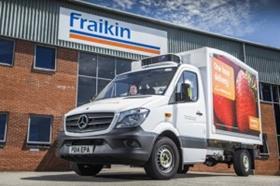
“I would say, in many respects, the whole Covid crisis is one of the best things that happened to Fraikin with the expansion of last-mile delivery. Sainsbury's went from 2,700 vehicles to 3,700, double shift to triple shift, and we've been right behind them all away. I believe that Sainsbury's home delivery slots have gone from 200,000 a week to 800,000 a week. Typically at Christmas, it would peak at 350,000.”
Fleet growth
In fleet terms, Fraikin has 4,000 vehicles on contract hire, a rental fleet of around 800 that is being expanded to 1,000 and 4,500 customer vehicles under fleet management. That total of just over 9,000 will exceed 10,000 in 2021.
Hall says that the three-year plan includes “a couple of big milestones”, one of which is to get turnover above £100m.
“I'm confident we'll hit that in 2022,” he says. “I'm very pleased to get the EBIT back up, and the 2020 numbers are going to look very strong. We've done a remarkable job this year in getting those numbers right.”
PF a cultural mis-match
The attempt by Petit Forestier to buy Fraikin Group was a worrying time for Fraikin UK, as one plus one very rarely adds to up to two in such acquisitions. So it must have come as a relief when the deal was blocked by the EU competition authorities.
“I felt that the two cultures are oil and water for a start,” says Hall. “I know a little bit about the PF culture and I admire them as a business. Some of the guys that have worked there have come to work for Fraikin and they talk about a very well-run organisation, family-owned, but run in a very regimented, military way.
“Certainly I was worried that the two cultures would never mix. It was a worrying time for the majority of the business and I'm happy it didn't go through. We've got a good relationship with our shareholders, and we're clear in what we've got to do. I've worked in private equity long enough to understand that your job is to drive enterprise value. Do that and everyone's happy.”
While Fraikin has benefited from the boom in home delivery as a result of Covid, other sectors have suffered badly, putting some customers at risk of failure.
“In early March when this was unfolding, I sat down with the finance team and we built up a week-to-week model,” says Hall. “We divided our customers into very high, high, medium and low risk. We modeled 100% of the very high risk would default, 80% of the high risk, 35% of medium and 5% of low. That would have resulted in a 40% drop in revenue.
“At the same time we modeled delaying government payments and freezing landlord payments. We knew we were going to be OK.
“More importantly, we felt we couldn’t abandon people when they needed help. The first thing I said was ‘we're going to pay all our suppliers, because if we hold on to cash we create a worse situation’.
“We paid all of our suppliers on time. We didn't pay the government and we renegotiated with our landlords, but we paid our suppliers. At the same time, we were being paid by most of our customers, so we were in a position with customers like World Duty Free, whose business collapsed overnight, to give them a payment break.
“We got some really good emails from people thanking us, saying ‘we won't forget this.’ But the impact was much less than I anticipated – ultimately we saw a 7% drop in income.”
This was helped by the fact that Fraikin was not under any pressure from its lenders.
“We've got about £120m worth of assets on contract, 90% of which is financed through a group securitisation programme,” says Hall. “That package is with a consortium of 10 banks in Europe which funds the French, Spanish and the UK business.
“That's something I'm going to be looking at because it’s very important for Fraikin to have multiple financing lines that we can use.”
Cash is king in Covid crisis
The secure financing and strong cash generation of the business ensured Fraikin could ride out the Covid crisis.
“The businesses that struggle during Covid are the ones that have a cash problem,” says Hall. “The liquidity of our business is strong so we've got a good solid foundation and lots of oxygen in the business, basically.
“Anyone that's got a cash problem is now exposed. If you have a working capital liquidity issue in the current climate, you're going to hit a wall very quickly. You've also got various private equity firms moving into the sector starting to look at businesses.
“My message to our shareholders is that there's a window of opportunity in the next 18 months that we may well want to look at. Some regional M&A, where we can take advantage of that situation, and bring in complementary businesses with contracted revenues. Clearly opportunities are there, and we are very alert to that at the moment.”
Driving improvement
With Fraikin providing the vehicle and a complete fleet management service, it looks like only a small step to providing drivers too, but Hall believes that is a step too far.
“To me, if you're Sainsbury's, you have to own the driver because he's a representative of your business,” he argues. “He has face-to-face interaction with the customer, he's got a Sainsbury's jacket on and they own the products in the back of the vehicle. All they want from us is 3,700 vehicles working 24/7.
“When I was at SafetyKleen, I had a similar requirement. The thing that was most important for me was I had 250 vehicles every day, doing 14 visits a day, and every visit was generating revenue. If 10% of my trucks were off the road, I could only ever realise 90% of my daily revenue.
"When I looked at the month, the single biggest reason why I couldn't meet my revenue number was vehicles, and so to me, Sainsbury's are very clear on that.”
But with fixed-price contracts the driver can have a huge effect on the running costs of the vehicle in terms of added R&M as well the fuel and damage which the customer pays for.
“The driver is the single biggest variable in the equation clearly, so first of all, we monitor the driver's performance,” says Hall. “When I was in Saudi, I ranked all of my customers’ drivers, best to worst, and I rewarded the best driver once a quarter.
“When Fraikin first supplied vehicles to a customer, we would get the drivers together and do the handover. We always said to them, ‘by the way, we're going to monitor the driving performance’, and the drivers would say ‘no, I don't want to drive a Fraikin vehicle because I'm being monitored’.
“I said to our guys, ‘right, we'll pick the best driver and we'll give him 1,000 Riyals [£200] and put it on LinkedIn’. As soon as we started rewarding the best driver, people were queuing up to drive a Fraikin vehicle. We showed them what good driving looks like, we showed them what we're measuring them on and we rewarded the best drivers.
“The bottom three drivers, we trained them once, trained them twice, third time, we had a conversation with the customer to say ‘this guy is costing you money’. We could link his performance - speeding, harsh braking and cornering - to the damage to the vehicle.
“Bear in mind, our customers, if they damage the vehicle, they pay for it. If they kerb a wheel or blow a tyre, they pay for it.
“We don’t do that in the UK yet but I'm very keen on building up a dashboard for each customer because when I was a Fraikin customer, I wanted a dashboard that showed me that I've got control of my fleet's cost.
“I could then benchmark the drivers against other similar people. I would be able to say to a customer, ‘do you realise your drivers are consuming 10% more fuel than your peer group, because they've got a heavy right foot?’
“One of the decisions I've made is that we are retrofitting every single Fraikin asset with a telematics system and a camera so we can start providing proper data to customers to help them optimise their fleet and manage the driver because the driver is the biggest variable.”
Hall is currently assessing which telematics and camera package to fit and plans to start the roll out early in 2021.
“We've got someone from Masternaut who's just joined us, whose full time job now is to build that capability,” he says.
Three year life - even on electric
Another change Hall is implementing is a policy of changing customers’ vehicles every three years rather than five to seven years which has become more common.
“Everyone thinks the longer the contract the better but actually, if we can swap every three years, it's better,” he says. “It's more predictable, there is less exposure on costs and you're renewing the fleet quicker. There is a mindset that I must make the vehicle last as long as possible but the bottom line is, once you get beyond three years, it becomes unpredictable and big things start to fail.”
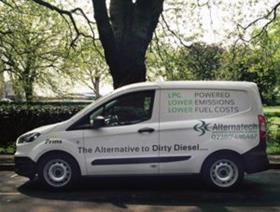
Even when it comes to acquiring electric vehicles, which cost three times more than conventional diesel, Hall argues that running them for seven to 10 years will not be cost effective.
“When you're signing a contract for electric vehicles, in the back of your mind is the fear that the residual value could just drop, because no one will want these vehicles,” he says. “My opinion is that the shorter contracts for 36 months are better for both the customer and Fraikin.
“I've done a lot of research on electric vehicles since I came back to the UK. My take on it is the manufacturers are not pushing the agenda very hard so what you need are disruptors.
"I like Arrival - that vehicle is a game changer in my opinion. I feel that we need non-automotive businesses that have energy and design backgrounds to come into the sector and disrupt it and shake up the manufacturers.
“The second thing is that once you're into electric vehicles, you're not worried about Euro-6, so you will get the importation of Korean and Chinese technology. They never came into the European market because of Euro-6.
“We also need to collaborate to accelerate. People have to form collaborative groups to get electric vehicles into the market quicker. We've partnered with NeoCharge so Fraikin can provide you with the vehicle, a charging station and the maintenance of the vehicle altogether as one package in a monthly rental.
"There's a lot of work going in how to change our TCO model from cost per kilometer into cost per kilowatt. I'm very excited about electric vehicles."
Accelerate the disruptors
While demand is growing Hall believes that the traditional OEMs are dragging their feet on electric vehicles.
“Everyone wants a quotation but no one can get a vehicle at the moment," he says. "There's just not a lot of volume out there. What I've said is I want Fraikin to push this by seeing if we can accelerate the disruptors.
"We've budgeted for electric vehicles in our plan next year and the year after. We haven't gone crazy and our plan that isn't relying on electric vehicles but I certainly want Fraikin pushing the agenda very hard.”
While light commercials will go electric in the next 10 years, the big question is will heavy trucks follow suit or go the hydrogen route? Providing enough green hydrogen made from low carbon electricity remains a challenge and batteries are getting better all the time.
“My initial thoughts were hydrogen but Mercedes’ roadmap for EVs has a 26-tonne tractor units on a battery with a 1,000km range,” says Hall. “My understanding was you had to have hydrogen to get the range but now Mercedes are saying by 2024, they'll have a product which is fully electric and can do 1,000 kilometers. To me, it's swinging back towards battery again.
“It always evolves and all of a sudden someone does something and the herd goes that way, then the herd goes this way. Certainly to me, practically speaking, I understand batteries better so I feel more comfortable with them. I get the concept of a battery on wheels being a unit that can meet most applications and from the supply chain point of view a battery is a much simpler challenge.”
Leaving aside the technicalities, the biggest cost in an EV remains the battery, and no one knows how long they will last in a commercial vehicle. So will Fraikin be happy to own these expensive assets?
“It's a good question,” Hall admits. “I'm trying to work that out. I'm sitting here thinking do we own a bunch of assets that have a 10-year lifespan that we then deploy into shorter contracts with just the chassis or do we just simply write them down? I don't know.
“We do know the battery technology is evolving all the time. So you could end up buying a whole bunch of batteries and finding that they're obsolete in two years. The rate of change is a bit worrying and, of course, it stops you investing.”













